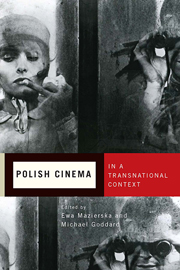Book contents
- Frontmatter
- Contents
- Acknowledgments
- Introduction: Polish Cinema beyond Polish Borders
- Part One The International Reception of Polish Films
- Part Two Polish International Coproductions and Presence in Foreign Films
- Part Three Émigré and Subversive Polish Directors
- 11 An Island Near the Left Bank: Walerian Borowczyk as a French Left Bank Filmmaker
- 12 Beyond Polish Moral Realism: The Subversive Cinema of Andrzej Żuławski
- 13 Polanski and Skolimowski in Swinging London
- 14 The Elusive Trap of Freedom?: Krzysztof Zanussi's International Coproductions
- 15 Agnieszka Holland's Transnational Nomadism
- Selected Bibliography
- List of Contributors
- Index
12 - Beyond Polish Moral Realism: The Subversive Cinema of Andrzej Żuławski
from Part Three - Émigré and Subversive Polish Directors
Published online by Cambridge University Press: 05 April 2014
- Frontmatter
- Contents
- Acknowledgments
- Introduction: Polish Cinema beyond Polish Borders
- Part One The International Reception of Polish Films
- Part Two Polish International Coproductions and Presence in Foreign Films
- Part Three Émigré and Subversive Polish Directors
- 11 An Island Near the Left Bank: Walerian Borowczyk as a French Left Bank Filmmaker
- 12 Beyond Polish Moral Realism: The Subversive Cinema of Andrzej Żuławski
- 13 Polanski and Skolimowski in Swinging London
- 14 The Elusive Trap of Freedom?: Krzysztof Zanussi's International Coproductions
- 15 Agnieszka Holland's Transnational Nomadism
- Selected Bibliography
- List of Contributors
- Index
Summary
Introduction: Żuławski versus Polish Realism
When Andrzej Żuławski's debut feature film, The Third Part of the Night (Trzecia część nocy, 1971) was released, it could only be received as a major scandal. Even in the relatively open and experimental context of “third generation” Polish cinema at the time, Żuławski's film was an affront to the most “sacred” period of both Polish history and its cinematic representation—namely, the Polish experience of World War II. This was, of course, a preferred subject of Polish school filmmakers such as Andrzej Wajda and Andrzej Munk, whose representations of Polish martyrdom, whether romantically heroic or ironic, were no preparation for the delirious, brutal, and expressionist presentation of these events in Żuławski's film. By the time of his third Polish feature, On the Silver Globe (Na srebrnym globie, 1977/1988), Żuławski could not have been further removed from the dominant tendencies toward realism evidenced by the Cinema of Moral Concern, of which he was a particularly severe critic. Eventually production was halted on the film and was only able to be resumed, in a truncated form, eleven years later. Meanwhile, the director had initiated another series of films made in France, beginning with L'important c'est d'aimer (The most important thing: Love, 1975), which, while aesthetically and contextually very different, nevertheless can be seen as a continuation and development of this critical escape in the necessarily transnational context of making films in another European country. This chapter will look at these two strands of Żuławski's cinematic career as related attempts to escape the limits of “moral realism” via expressive excess and argue that from the start this trajectory had transnational dimensions.
- Type
- Chapter
- Information
- Polish Cinema in a Transnational Context , pp. 236 - 257Publisher: Boydell & BrewerPrint publication year: 2014

